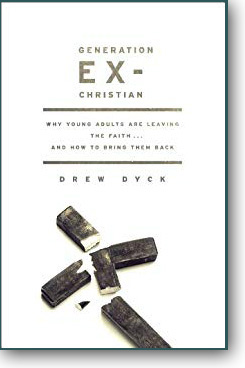Steve Cable exposes some atheist myths and the false ideology of scientism, all designed to destroy people’s faith.
A Two-Pronged Attack Against Christianity

Atheist attacks against American Christianity are gaining more traction in our society. Their success can be readily seen in the growth of the number of American young adults who do not profess to be Christians. Tracking recent trends, around 50% of American Millennials fall in this category, with most of those identifying as atheist, agnostic or nothing in particular. More identify as nothing in particular than as atheist, but the atheist attacks certainly have a role to play in their ambivalent feelings about Christianity.
What have atheists done to create a cultural milieu that is drawing more and more young Americans away from Christianity? In this article, we will focus on two prominent prongs of the attack against Christianity. Those prongs are:
1. Fabricating myths around the premise that Christianity and modern science are enemies of one another and have been so since the advent of modern science, and
2. Promoting the philosophy of scientism as the only way to view science.
First, the myths are an attempt to cause people to believe that the Christian church and a Christian worldview were and are anti-science. They want us to believe that the findings of science are counter to the make-believe teachings of Christianity and the Bible. They want us to look back at history and believe that the church was actively opposing and trying to suppress scientific knowledge. As Michael Keas tells us in his 2019 book Unbelievable, “These stories are nothing but myths. And yet some leading scientists . . . offer these stories as unassailable truth. These myths make their way into science textbooks . . . (and) enter into popular culture, whereby the myths pass as accepted wisdom.”{1}
However, many historians and philosophers have correctly pointed out that the Christian worldview of an orderly universe created by an involved God produced the mindset that gave birth to the scientific revolution. In his book How the West Won, sociologist Rodney Stark states, “Christianity was essential to the rise of science, which is why science was a purely Western phenomenon . . . science only arose in Christian Europe because only medieval Europeans believed that science was possible and desirable. And the basis of their belief was their image of God and his creation.”{2} In this article, we consider the key figures who propagated this myth and some of the falsified stories they have foisted upon us.
Second, they want us to accept scientism as the only valid way to view the role of science in our understanding of the universe. What is scientism? In his 2018 book Scientism and Secularism, professor of philosophy J. P Moreland defines it this way: “Scientism is the view that the hard sciences provide the only genuine knowledge of reality. . . . What is crucial to scientism is . . . the thought that the scientific is much more valuable than the non-scientific. . . . When you have competing knowledge claims from different sources, the scientific will always trump the non-scientific.”{3}
But scientism “is not a doctrine of science; rather it is a doctrine of philosophy . . . (In fact,) scientism distorts science.”{4} This philosophical doctrine came into favor among the public not because of scientific results, but rather as the result of proponents presenting it in popular ways as if it were the undisputable truth. As Moreland points out, “It is not even a friend of science but rather its enemy.”{5}
Myths about Christianity and Science
Atheists want to create stories to demonstrate that Christians are and have been the enemies of scientific exploration and discovery. Why this drive to recreate the past? They want to encourage people to turn away from Christianity as an enemy of science and weaken the faith of believers.
As Michael Keas makes evident in Unbelievable, this thinking is not based on reality. Instead, historical myths have been created to bolster their position either as a result of ignorance of the actual history or intentional deceit. After creating these myths, they use the educational system and mass media to ingrain these myths into the thinking of the masses.
Keas specifically looks at seven myths used for this purpose which we find embedded in our textbooks and proclaimed by popular television programs. To understand the nature of these myths, let’s consider two of the ones discussed by Keas.
Many of you learned of the Dark Ages, a period of time between A.D. 500 and 1500 where textbooks have claimed that science and the arts were stifled by the control of the church which opposed scientific understanding. In truth, this view is not supported by historical evaluations of that time. As reported in Stark’s revealing book, How the West Won, “Perhaps the most remarkable aspect of the Dark Ages myth is that it was imposed on what was actually “one of the great innovative eras of mankind.” During this period technology was developed and put into use on a scale no civilization had previously known.{6} Keas found that this myth first appeared in textbooks in the 1800s but did not surface with an anti-Christian slant until the 1960s. Carl Sagan, and later Neal deGrasse Tyson, would help promulgate this myth on television through their Cosmos series.
Another myth exploded by Keas is that “Copernicus demoted humans from the privileged ‘center of the universe’ and thereby challenged religious doctrines about human importance.”{7} In fact, Copernicus as a Christian did not consider his discovery that the earth orbited the sun a demotion for earth or humans. What Copernicus saw as unveiling the mysteries of God’s creation over time began to be pictured as a great humiliation for Christians. In the 1950s some scientific writers began using the term “the Copernican principle” to refer to the idea “that the Earth is not in a central, specially favored position”{8} in the cosmos. As one Harvard professor has noted, “This is the principle of mediocrity, and Copernicus would have been shocked to find his name associated with it.”{9}
Keas also documents how this atheist strategy also pretends that many early scientists were not Christians. Johannes Kepler, known for his discovery of the three laws of planetary motion, is cited by Sagan in Cosmos as someone who “despaired of ever attaining salvation,”{10} implying that Kepler always felt this way. Sagan leads one to believe that in his astronomical discoveries Kepler was somehow freed from this concern. Yet from Kepler’s own writing it is very clear that he was a Christian, telling people shortly before his death that he was saved “solely by the merit of our savior Jesus Christ.” And speaking of his scientific endeavors he wrote, “God wanted us to recognize them [i.e. mathematical natural laws] by creating us after his own image so that we could share in his own thoughts.”{11}
Much of the reported relationship between science and Christianity is a myth made up to strengthen the atheist position that science repudiates Christianity and makes it superfluous and dangerous in today’s enlightened world. Nothing could be further from the truth, as a Christian worldview was foundational for the development and application of the scientific method.
Methodological Naturalism: A Farce
What about the prevalence of scientism, a belief system claiming that the hard sciences provide the only genuine knowledge of reality?
When considered carefully, the whole concept of scientism is a farce. Why? Because as philosopher J. P. Moreland points out, “Strong scientism is a philosophical assertion that claims that philosophical assertions are neither true nor can be known; only scientific assertions can be true and known.”{12} So the premise is self-refuting. They are saying that only scientific facts can be objectively true. Thus, the statement that only scientific facts can be true must be false because it is a philosophical assertion, not a scientific fact.
Another example of the faulty philosophy behind scientism comes in their insistence on adopting methodological naturalism as a criterion for science. Methodological naturalism is “the idea that, while doing science, one must seek only natural causes or explanations for scientific data.”{13} This idea immediately demotes science from being the search for the truth about observable items in this universe to being the search for the most plausible natural cause no matter how implausible it may be.
Although they appear to be unsure as to whether to apply the concept uniformly to all forms of science, its proponents are sure that it definitely should be applied to the field of evolutionary science. They make the a priori assumption that life as we know it originated and developed by strictly impersonal, unintelligent forces. No intelligence can be allowed to enter the process in any way. This approach to trying to understand the current state of life on earth is certainly an interesting exercise leading to a multitude of theories and untestable speculations. It is a challenging mental exercise and is valuable as such. However, scientism does not stop there. They declare that their unsupported (and I would say unsupportable) theories must be the truth about our origins, at least until replaced by another strictly naturalistic theory.
This approach seems to be an odd (and unfruitful) way to go after the truth due to at least three reasons. First, many other areas of science which include intelligent agents in their hypotheses are respected and their results generally accepted, common examples being archaeology and forensic science. Second, the current state of evolutionary science primarily appears to be tearing holes in prior theories, e.g. Darwinian evolution, rather than closing in on a plausible explanation. And, third, scientists are continuing to find evidence supporting a hypothesis that intelligent actions were involved in the formulation of life on earth.
If the sum of the available evidence is more directly explained by the involvement of some intelligent agent, then it would be reasonable to accept that potential explanation as the leading contender for the truth until some other answer is developed that is more closely supported by the available evidence. This is the attitude embraced by the intelligent design community. They embrace it because so much of the evidence supports it, including
1. the inability of other hypothesis to account for the first appearance of life,
2. the complexity of the simplest life forms with no chain of less complex forms leading up to them,
3. the relativity sudden appearance of all types of life forms in the fossil record,
4. the fine tuning of the parameters of the universe to support life on earth, and
5. the emergence of consciousness within humans.
In contrast, those supporting theistic evolution appear to do so in order to conform to the methodological naturalism of their peers. They claim to believe that God does intervene in nature through acts such as the miracles of Jesus and His resurrection. But they claim that God did not intervene in the processes leading up to the appearance of mankind on this planet. In my opinion, they take this stance not because the evidence demands it, but because methodological naturalism does not allow it. As Moreland opines, “Methodological naturalism is one bad way to put science and Christianity together.”{14}
Things Science Cannot Explain / God of the Gaps
As we have seen, scientism is a philosophy that says the only real knowledge to be found is through application of the hard sciences and that no intelligence can be involved in any of our hypotheses. So, they believe hard science must be capable of explaining everything (even if it currently doesn’t).
In this section we will consider some very important things that science cannot now nor ever be able to explain. In his book, Scientism and Secularism, J. P. Moreland lists five such things for us.
First, the origin of the universe cannot be explained by science. Why? Science has been able to identify that the universe most likely had a beginning point. But as Moreland points out, “Science can provide evidence that the universe had a beginning; it cannot, even in principle, explain that beginning; that is, it cannot say what caused it. . . No real thing can pop into existence from nothing.”{15} He points out three specific logical reasons science cannot address this issue:
1. A scientific explanation cannot be used to explain the universe because scientific explanations presuppose the universe.
2. Science cannot explain the origin of time and without time no explanation can be considered.
3. Coming-into-existence is not a process which can be reviewed and explained because it is an instantaneous event. Something either does or does not exist.
Second, the origin of the fundamental laws of nature. All scientific explanations presuppose these laws. We can conceive of a universe where these laws might be different resulting in a different reality, but we cannot explain how our universe came into being with the laws we see active around us.
Third, the fine-tuning of the universe to support life. As far as science is concerned the parameters of the forces within this universe can be observed but we cannot know what caused them to assume the values they do. However, in recent years it has been discovered that our universe “is a razor’s edge of precisely balanced life permitting conditions.”{16} Over one hundred parameters of this universe, such as the force of gravity, the charge of an electron, the rate of expansion of the universe, etc., must be precisely balanced or there could be no life in the universe. Science cannot answer the question of why our universe can support life.
Fourth, the origin of consciousness. In this context consciousness is the ability to be aware of oneself and entertain thoughts about things which are outside of oneself and possibly outside of one’s experience. From a naturalist point of view, “the appearance of mind is utterly unpredictable and inexplicable.”{17} However, God may choose to create conscious beings; beings that are capable of asking about and discovering the works of their creator.
Fifth, the existence of moral laws. As the late atheist philosopher Mackie admitted, the emergence of moral properties would constitute a refutation of naturalism and evidence for theism: “Moral properties constitute so odd a cluster of properties and relations that they are most unlikely to have arisen in the ordinary course of events without an all-powerful god to create them.”{18}
These five important questions can never be answered if scientism’s flawed premise were true. However, Christian theism answers each of these questions and those answers are true if God is the real creator of the universe.
Integrating Christianity and Science
Scientism claims that you cannot integrate Christianity and science. Instead, they claim all theology is nonsense and only science exists to give us the truth. As Moreland points out, “One of the effects of scientism, then, is making the ridicule of Christianity’s truth claims more common and acceptable (which is one of scientism’s goals).”{19}
If this view is clearly wrong, how should we as Christians view science and its relationship with Christianity and the Bible? First, we need to understand that the topics addressed by science are in most cases peripheral to the topics covered in the Bible. The Bible is primarily concerned with God’s efforts to restore people from their state as enemies of God back into eternal fellowship with Him.
One area of significant interaction is the question of how this universe came to exist in its current state. How one views that interaction (i.e. as adversarial or as complementary) depends on whether they are clinging to the unsupported myth of unguided evolution or to the new science of intelligent design. As Moreland states, “Science has done more to confirm the Christian God’s existence than to undermine it, and science has provided little or no evidence against belief of theism. Science has, however, raised challenges to various biblical texts, and Christians need to take those challenges seriously.”{20}
Moreland suggests there are five ways to relate issues in science and Christian philosophy. Let’s consider two of those methods. One is the complementarity model. In this model, two disciplines are addressing the same object or feature but from different, essentially non-overlapping perspectives. “Neither one purports to tell the whole story, but both make true claims about reality.”{21} This is the model used by advocates of theistic evolution who take as gospel the latest claims of evolutionary science while saying of course God kicked off the whole process including us in His plan for the universe.
Another way to interact is called the direct interaction model. In this model, theories from theology and from science may directly interact with one another on some topic, either positively or negatively. One area might raise rational difficulties for the other. This approach has the most potential for bringing information from different fields together into a fuller picture of truth. Intelligent design is an area where this model is applied as it questions the validity of eliminating intelligence from the options considered in understanding the development of life on earth.
Since scientism swears that science is the only source of truth, even when scientists cannot agree as to what that scientific truth is, they want to discount inputs from any other source no matter how helpful. So the direct interaction model is a difficult road to take. What are the rational criteria for going against the experts? Moreland suggests there are four criteria for Christian theologians to decide to take this road.
1. Make sure there is not a reasonable interpretation of the Bible that resolves the tension.
2. There is a band of academically qualified scholars who are unified in rejecting the view held by a majority of the relevant experts. In this way, we know that there are people who are familiar with the details of the majority view, who do not believe that it is true.
3. There are good non-rational explanations for why the expert majority holds the problematic view. For historical, sociological, or theological reasons, the majority is not ready to abandon their position rather than because their evidence is overwhelming. “For example, the shift from creationism to Darwinism was primarily, though not exclusively, a shift in philosophy of science.”{22}
Given the large amount of evidential support for a Christian worldview, any view that is counter to central components of a Christian worldview should be rejected precisely for that reason. Any view meeting the first three criteria that also attempts to undermine key parts of a Christian worldview will be overwhelmed by the significant rational support for a Christian worldview.
As followers of the God of real truth, Christians need to realize that the so-called truths being taught to justify science over theology are in fact myths and/or self-refuting statements. Every Christian needs to be able to address these fallacies in today’s popular science culture. Equip your young adults with this understanding and more by attending our summer event called Mind Games Camp. More information can be found at probe.org/mindgames.
Notes
1. Michael Keas, Unbelievable: 7 Myths About the History and Future of Science and Religion, ISI Books, 2019, 2.
2. Rodney Stark, How the West Won: The Neglected Story of the Triumph of Modernity, ISI Books, 2014 p. 304, 315.
3. J. P. Moreland, Scientism and Secularism: Learning to Respond to a Dangerous Ideology, Crossway, 2018, 26 and 29.
4. Ibid., p. 23.
5. Ibid., p. 55.
6. Stark, p. 76.
7. Keas, p. 4 and Chapter 6.
8. Herman Bondi, Cosmology, Cambridge University Press, 1952.
9. Owen Gingerich, God’s Universe, Belknap Press, 2006.
10. Sagan, 1980 Cosmos TV series, episode 3.
11. Kepler, letter to Herwart von Hohenburg, April 9/10, 1599.
12. Moreland, p. 52.
13. Ibid., p. 131.
14. Ibid., p. 159.
15. Ibid., p. 138.
16. Ibid., p. 146.
17. Ibid., p. 151.
18. J. L. Mackie, The Miracle of Theism, Oxford, 1982, p. 115.
19. Moreland, p. 31.
20. Ibid., p.174.
21. Ibid., p. 184.
22. Ibid., p. 192.
©2019 Probe Ministries



 Are there others who are seeing the same degree of disconnect with the truths of Scripture in the life styles and life choices of young, adult Americans? I want to look at one such prominent voice speaking out about these same concerns. Drew Dyck is the author of Generation Ex-Christian: Why Young Adults Are Leaving the Faith . . . And How to Bring Them Back
Are there others who are seeing the same degree of disconnect with the truths of Scripture in the life styles and life choices of young, adult Americans? I want to look at one such prominent voice speaking out about these same concerns. Drew Dyck is the author of Generation Ex-Christian: Why Young Adults Are Leaving the Faith . . . And How to Bring Them Back
